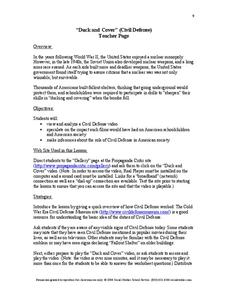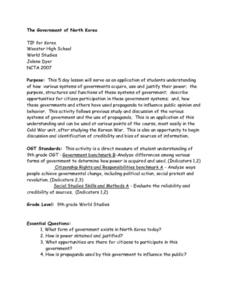Curated OER
Cold War Era Film Censorship: High Noon- a Slice of Americana Or Communist
Students study of the effects of the Cold War on the home front. They analyze the film High Noon according to an abbreviated version of the standards that films were judged by in the early 1950s and determine whether or not High Noon is...
Smithsonian Institution
POWs
Why did Vietnam POWs and their families receive more media attention than POWs in previous wars? To answer this question, class members view artifacts, read articles, and engage in class discussion. Individuals then assume the voice of...
Curated OER
The Cold War in Popular Music
Learners analyze pop culture songs to identify cold war themes and chart. They comprehend and explain why the Cold War took place and ended and assess its significance as a 20th century event. Students conduct a song analysis of the...
Social Studies School Service
“Duck and Cover” (Civil Defense)
Bert the Turtle models for viewers the 1950s Civil Defense Duck and Cover strategy that was supposed to protect citizens from a nuclear blast. After viewing the video, watchers are asked to consider the motivations of the producers of...
Curated OER
Brave New World
Students view a video about the effects of World War II on the map of Europe. They discuss the video and answer questions. They work together to identify accomplishments that best represent American culture.
Curated OER
The Arms Race - From the Beginning to the End
Ninth graders focus on the political and technological developments of the Cold War. They, in groups, read and summarize the speech they are given. They should provide a short presentation based on their interpretation.
Roy Rosenzweig Center for History and New Media
Analyzing Political Campaign Commercials
Imagine a lesson that models for learners how to separate facts from opinions. How to detect bias. How to evaluate a source of information. How to identify propaganda. Although designed for middle schoolers, the activities in this packet...
Curated OER
I Spy with my Little Eye…
Young scholars read an article on Vienna. In this ESL lesson, students explore a recent incident between Russia and the United States, then complete several activities that reinforce the information in the article.
Curated OER
Korean War
Students visualize where the Korean Peninsula is located and what are some neighboring countries. They read a handout giving background information on Korea's 20th centuy history and Truman's Statement and answer questions in their...
Curated OER
Kansas in the Movies, the Cold War Period
Young scholars are instructed using a cross curricular type of lesson. The time period that they focus upon is the founding of the Soviet Union as a superpower in the world after WWII. The rise of communism is also taken into consideration.
Curated OER
The Government of North Korea
Ninth graders study the Government of North Korea. They identify the system of government of North Korea today and explain how power is acquired, used and justified by it. They describe the use of propaganda by this government system...
Curated OER
To Live
Students explore Chinese life during the Cultural Revolution. They read and discuss a brief historical essay on 20th century China as well as viewing a fictionalized film account of the time period titled, "To Live". They write a...
Curated OER
East Asia--The Asian Holocaust
Ninth graders study the effects of the Asian Holocaust by comparing it to the Nazi Holocaust. They view a Power Point and discuss the comparisons between both Holocausts. As they compare and contrast both, they discuss their reactions...














